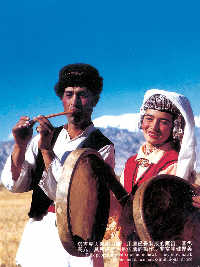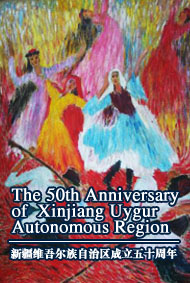| |
Rescue and Protection of Xinjiang Traditional Arts
( 2005-09-13 )
 Traditional Arts of Xinjiang Ethnic Minorities Traditional Arts of Xinjiang Ethnic Minorities
 Anyone who visits theHeavenly Lake, the grand desert, the Steppes, or theKanas Lakeis sure to be enchanted by the breathtaking scenery. Likewise, in the lively Meshrep, the echoes of pastoral songs, resounding eagle cries, and solemnNadam(recreation or games) gatherings radiate the charm and vitality of the traditional cultures of Xinjiang's ethnic groups. Anyone who visits theHeavenly Lake, the grand desert, the Steppes, or theKanas Lakeis sure to be enchanted by the breathtaking scenery. Likewise, in the lively Meshrep, the echoes of pastoral songs, resounding eagle cries, and solemnNadam(recreation or games) gatherings radiate the charm and vitality of the traditional cultures of Xinjiang's ethnic groups.
Over history, due to the mixture of different peoples and tribes, and the diversity of living environments on a vast land, as well as the special status as the juncture of Eastern and Western cultures, Xinjiang has bred many an ethnic traditional cultures. Generally speaking, the traditional arts created by the 13 indigenous peoples in Xinjiang can be categorized, according to their differences in production modes and lifestyles, into three major types: Oasis Culture, Steppes Culture, and Highland Culture.
The Oasis Culture is represented by the Uygurs, who live at the rim of the Talim Basin in Turpan, Hami, and the Valley of Ili River, where mountains and the Gobi or other deserts surround patches of oases. The Oases dwellers are settled farmers who live together in villages.
Regarding life as a blessing in spite of hardship, they have a great passion for many forms of entertainment, from music and dance to all kinds of Oyun (games). In their varied social gatherings, like Meshrep, Olturush, and Chay, not only are songs and dances a must, but also many fun and interesting games as improvisational poetry recitation,riddles, Dadai'er (briefly define what this is; the internet is not showing this term), drum-passing, and humorous challenges.
The Kazaks, the Kirgizs, and the West Mongols residing in the Steppes pastures of the Tian and Altai mountains represent the Steppes Culture. These hunting, herding, and tent-dwelling nomads live a life dependent on and in harmony with Nature, which underlies their worship for nature and their generous, sanguine character.
|
|

